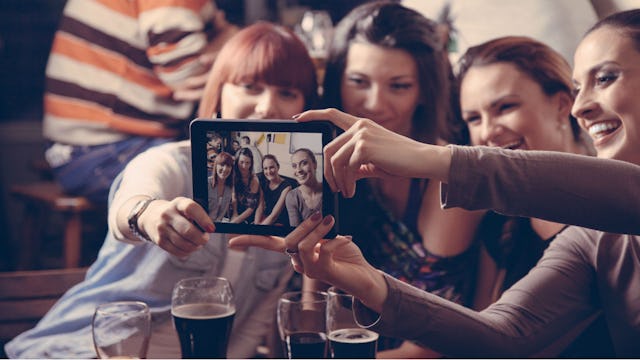I Am A Mom Who Doesn’t Drink, And I Feel Left Out Sometimes

One morning over a year ago, I looked at myself in the mirror and hated everything I saw. I hated my beer belly and the weight I had gained from years of too many liquid calories and food I didn’t have the willpower to say no to when I was drunk. I hated my puffy eyes and face. I hated the way my head felt, still fuzzy from the night before.
I felt disgusting. I was disgusted with myself. I was angry. I was done. I don’t know what it was about that morning, but that was the day I finally admitted I had a problem.
Sometimes I blame genetics and my fucked up childhood, but I take responsibility for my relationship with alcohol. I used childhood abuse, work, and the stress of having kids as reasons to drink. I used minor accomplishments, getting through the week, and any reason I could find to have a drink. But I wasn’t drinking to fit in, or celebrate, or even to tolerate my kids. I was drinking to escape. I was drinking because I am an addict. I am an alcoholic.
It has taken a lot of work, several tries, and many shameful conversations to tell you I am now sober. I have had the help of other addicts, friends, a supportive partner, and an amazing therapist to get to where I am today. I am not perfect or as mentally healthy as I want to be, but I am clean. I have a clearer vision of where I want to go if not knowing exactly where I want to end up. But even though I am proud of my sobriety and am happy for it, I do miss drinking.
At school functions, I don’t join in on the joke about wishing the PTO sold booze to raise money for the new playground equipment. I no longer declare I need a drink when my kids are acting like assholes. I crack cans of seltzer and drink ridiculous amounts of tea and coffee at parties and on date nights. When someone asks me if I would like a beer or a mixed drink, I say, “No thanks, I’m good.”
But I’m not good. I am jealous. I am mad that I can’t have just a drink or two to let off steam, to ease tension from a long day or long week. I am pissed that I have anxiety and depression and a disease that simultaneously extinguishes and fuels each of them. I feel left out of the easiness of having a drink with friends.
Acquaintances don’t notice if I decline a drink or don’t outwardly judge what may seem like prudishness. My outer circles of friends who aren’t sure why I’m not drinking give me an odd stare because they know my love for beer; they have witnessed me drink my body weight in IPAs and Miller Lite. And my inner circle of friends, the ones who I was honest with first, are sensitive and supportive to the point of me being both grateful and embarrassed. They are my safety net, yet I worry about inconveniencing their time when they choose not to drink around me.
I know this is my journey, but when you take something as common and normalized as alcohol out of a parent’s repertoire, it seems to affect everyone. You are suddenly on the outside looking in.
I have not lost my sense of humor, but I am left out of the joke, the comical commentary about drinking. I have not lost friends, because I surround myself with supportive people, but I have lost the thing that sometimes brought us together. I long for alcohol the way you would an old friend or an unrequited love. It’s like she is busy making everyone else happy, and I miss her. I see her relationship with everyone else, and I feel left out.
I am learning to mourn the loss of alcohol. I have accepted its power over me and the role it played and will play in my life if I drink again. Instead of driving the bus to the party, I’m not even on the bus most of the time. I absolutely feel left out when I hear other moms and dads talking about going out for drinks, cracking open a bottle of wine, or just kicking back with a beer. I feel like I have failed myself somehow even though I know the truth is that I have done the opposite.
But feelings, like the gin I used to pour every night, are fluid. They wash over me. They flow between pride and jealousy. They warm my insides, burn my brain, and cool my heart. I let them be what they need to be. Sometimes that means feeling left out. But being on the outside has helped me find my way back. It has helped me find a safe way in.
This article was originally published on